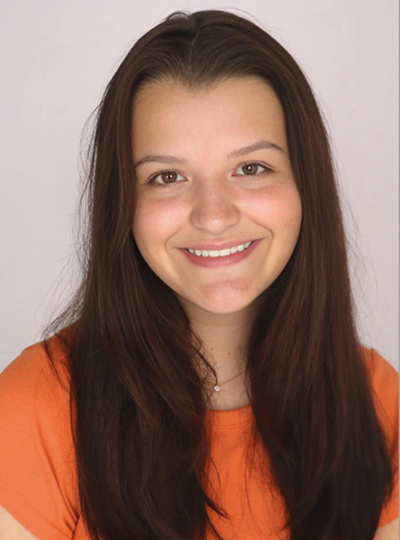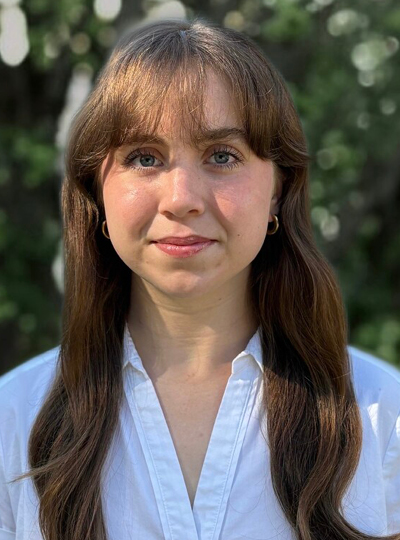
2025 Trainees

O. Maryam Adeyemo (Tian Lab)
Maryam Adeyemo is a Ph.D. student in the Department of Chemistry at Purdue University. She studies the structural and functional biology of the amyloid precursor protein (APP). Her research integrates protein purification, cryo-EM, EPR spectroscopy, and biochemical assays to investigate the molecular mechanisms of APP and its relevance to Alzheimer’s disease. Through the MBTP, she seeks to strengthen her expertise in biophysical methods, foster interdisciplinary collaborations, and prepare for a career in biotechnology and drug discovery.

Sandali Piladuwa Gamage (Tesmer Lab)
Sandali Piladuwa Gamage earned her Bachelor of Science in Molecular Biology and Biochemistry from the University of Colombo, Sri Lanka. She is currently pursuing her PhD in the Department of Biological Sciences at Purdue University, where her research focuses on the regulatory mechanisms of G protein-coupled receptor kinases (GRKs), particularly GRK5 and GRK6, in cardiovascular disease and cancer pathophysiology. She aims to discover new therapeutics by targeting these kinases, using biochemical, cell-based, and structural approaches such as X-ray crystallography to evaluate the potency and selectivity of novel compounds and to elucidate the structural basis of their binding.

Jayamini Gunaratne (Das Lab)
Jayamini is a third-year Ph.D. student in the Department of Chemistry. She earned her B.Sc. in Chemistry from the University of Peradeniya, Sri Lanka. Jayamini’s research focuses on protein–protein interactions between bacterial effectors, meta-effectors, and their host targets, with an emphasis on enzyme mechanisms and regulation. She uses X-ray crystallography and cryo-EM to obtain structural insights, along with biochemical, molecular biology, and yeast-based assays. Jayamini hopes to incorporate HDX-MS and other biophysical techniques to better understand the dynamic nature of these protein-protein interactions.

Meredith Hansen (Mesecar lab)
Meredith is a 2nd year Ph.D. student who graduated from Miami University in 2023 with a B.S. in Biochemistry and a minor in Molecular Biology. Her research focuses on structural and kinetic characterization of ubiquitin specific protease 7 (USP7) and the main protease in coronaviruses. USP7 is a deubiquinating enzyme that acts on mouse double minute 2 homolog (MDM2), the E3 ligase of tumor suppressor protein p53. Stabilization of MDM2 results in enhanced ubiquitination (and thus, destabilization) of p53. For this reason, there is interest in USP7 inhibitors as anti-cancer therapeutics. Currently, she is working to structurally characterize USP7 in complex with newly synthesized allosteric inhibitors via CryoEM. The main protease in coronavirus is responsible for cleaving large polypeptides into nonstructural proteins necessary for viral replication. Because it is well conserved across genera, it makes an ideal drug target. At the moment, she is working to kinetically characterize PDCoV, an understudied coronavirus, with FRET-based assays. She is also performing structural studies of PDCoV in complex with small molecule inhibitors via X-ray crystallography.

Lauren Hesting (Lyon Lab)
Lauren graduated from Purdue University with a Bachelor of Science in Genetics in 2022 and is in her 2nd year of the Cellular and Molecular Biology PhD program. She investigates the structure and function of phospholipase C (PLC) enzymes. Specifically, her work focuses on the PLC beta family whose signaling is implicated in cardiac arrhythmias, hypertrophy, and heart failure. Although the PLC beta enzyme family is highly conserved, there are isoform-specific differences in their basal activities and regulation by G protein subunits. Lauren is identifying and characterizing the regions within their C-terminal regulatory domains that underlie these different properties using biochemical and cell-based assays. She is also investigating how the properties of the membrane itself impact PLC beta membrane association and activation using dynamic light scattering, confocal microscopy, and cryo-EM.

Olivia Josephine Holmes (Liu Lab)
Olivia is a 2nd year graduate student in the department of Physics and Astronomy. She graduated from the University of Alabama with a degree in Physics in 2024. Olivia’s research involves developing new super-resolution imaging techniques to observe fast processes at the single-molecule level. These techniques will be used to monitor structural dynamics, Ca2+ dynamics, and metabolism kinetics in mitochondria. systems, the lab integrates cryo-electron microscopy, advanced spectroscopy (EPR, EXAFS, stopped-flow kinetics), and proximity labeling to define the molecular principles of metal homeostasis and the mechanisms of metalloproteins.

Misa Simone Meadows (Mesecar Lab)
Misa is a 2nd year graduate student from the Department of Biochemistry. She earned her Bachelor of Science in Chemistry with a concentration in Biochemistry along with a minor in dance from Belhaven University in Jackson, MS. She uses X-ray crystallography, FRET and other biophysical techniques to characterize the main coronavirus protease 3CLpro. In her free time, Misa enjoys doing yoga and taking her dog, Bane, on long sunset walks.

Luis Montalvo (Green Lab)
Luis is a 2nd-year Ph.D. student in the Department of Agricultural and Biological Engineering. He earned his B.Sc. in Microbiology from the University of Puerto Rico–Mayagüez and completed a postbaccalaureate in computational biology at the University of Puerto Rico–Río Piedras. His research focuses on developing new approaches to control the survival of individual bacterial species within complex microbial communities. He engineers inducible lytic genetic circuits and designs DNA nanostructures that promote antimicrobial peptide uptake into bacterial cells. He uses computational modeling to predict interactions between DNA nanostructures, cell membrane components, and antimicrobial peptides, and plans to expand his toolkit to include single-molecule FRET and molecular dynamics simulations. Ultimately, his work aims to enhance biocontainment of genetically engineered microbes and guide the development of next-generation antimicrobial strategies.